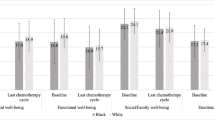Abstract
Background
This paper describes the ethnic and socioeconomic correlates of functioning in a cohort of long-term nonrecurring breast cancer survivors.
Methods
Participants (n = 804) in this study were women from the Health, Eating, Activity, and Lifestyle (HEAL) Study, a population-based, multicenter, multiethnic, prospective study of women newly diagnosed with in situ or Stages I to IIIA breast cancer. Measurements occurred at three timepoints following diagnosis. Outcomes included standardized measures of functioning (MOS SF-36).
Results
Overall, these long-term survivors reported values on two physical function subscales of the SF-36 slightly lower than population norms. Black women reported statistically significantly lower physical functioning (PF) scores (P = 0.01), compared with White and Hispanic women, but higher mental health (MH) scores (P < 0.01) compared with White and Hispanic women. In the final adjusted model, race was significantly related to PF, with Black participants and participants in the “Other” ethnic category reporting poorer functioning compared to the White referent group (P < 0.01, 0.05). Not working outside the home, being retired or disabled and being unemployed (on leave, looking for work) were associated with poorer PF compared to currently working (both P < 0.01).
Conclusion
These data indicate that race/ethnicity influences psychosocial functioning in breast cancer survivors and can be used to identify need for targeted interventions to improve functioning.

Similar content being viewed by others
Explore related subjects
Discover the latest articles and news from researchers in related subjects, suggested using machine learning.References
Kornblith AB, Ligibel J (2003) Psychosocial and sexual functioning of survivors of breast cancer. Semin Oncol 30:799–813
Ganz PA, Desmond KA, Leedham B et al (2002) Quality of life in long-term, disease-free survivors of breast cancer: a follow-up study. J Natl Cancer Inst 94:39–49
Giedzinska AS, Meyerowitz BE, Ganz PA et al (2004) Health-related quality of life in a multiethnic sample of breast cancer survivors. Ann Behav Med 28:39–51
Ganz PA, Rowland JH, Meyerowitz BE et al (1998) Impact of different adjuvant therapy strategies on quality of life in breast cancer survivors. Recent Results Cancer Res 152:396–411
Ganz PA, Rowland JH, Desmond K et al (1998) Life after breast cancer: understanding women’s health-related quality of life and sexual functioning. J Clin Oncol 16:501–514
Bower JE, Ganz PA, Desmond KA et al (2006) Fatigue in long-term breast carcinoma survivors: a longitudinal investigation. Cancer 106:751–758
Adler NE, Newman K (2006) Socioeconomic disparities in health: pathways and policies. Inequality in education, income, and occupation exacerbates the gaps between the health “haves” and “have-nots.” Health Aff (Millwood) 21:60–76
Adler NE (2003) Community preventive services. Do we know what we need to know to improve health and reduce disparities? Am J Prev Med 24:10–11
Rietman JS, Dijkstra PU, Hoekstra HJ et al (2003) Late morbidity after treatment of breast cancer in relation to daily activities and quality of life: a systematic review. Eur J Surg Oncol 29:229–238
Bower JE, Ganz PA, Desmond KA et al (2000) Fatigue in breast cancer survivors: occurrence, correlates, and impact on quality of life. J Clin Oncol 18:743–753
Andersen MR, Peacock S, Nelson J et al (2002) Worry about ovarian cancer risk and use of ovarian cancer screening by women at risk for ovarian cancer. Gyn Oncol 85:3–8
Irwin ML, Tworoger SS, Yasui Y et al (2004) Influence of demographic, physiologic, and psychosocial variables on adherence to a yearlong moderate-intensity exercise trial in postmenopausal women. Prev Med 39:1080–1086
Patel AV, Press MF, Meeske K et al (2003) Lifetime recreational exercise activity and risk of breast carcinoma in situ. Cancer 98:2161–2169
Meeske K, Press M, Patel A et al (2004) Impact of reproductive factors and lactation on breast carcinoma in situ risk. Int J Cancer 110:102–109
Marchbanks PA, McDonald JA, Wilson HG et al (2002) The NICHD women’s contraceptive and reproductive experiences study: methods and operational results. Ann Epidemiol 12:213–221
Marchbanks PA, McDonald JA, Wilson HG et al (2002) Oral contraceptives and the risk of breast cancer. N Engl J Med 346:2025–2032
Hays RD, Sherbourne CD, Mazel RM (1993) The RAND 36-item health survey 1.0. Health Econ 2:217–227
Ware JE Jr (1996) The SF-36 health survey. In: Spilker B (ed) Quality of life and pharmacoeconomics in clinical trials. 2nd ed. Lippincott-Raven, Philadelphia, pp 337–345
Alfano CM, McGregor BA, Kuniyuki A, Reeve BB, Bowen DJ, Baumgartner KB, Bernstein L, Ballard-Barbash R, Malone K, Ganz PA, McTiernan A (2006). Psychometric assessment of hormone-related symptoms among breast cancer survivors. PsychoOncology, 70:190–202
Alfano CM, McGregor BA, Kuniyuki A et al (In press) Psychometric evaluation of the brief cancer impact scale among breast cancer survivors. Oncology
Northouse LL (1981) Mastectomy patients and the fear of cancer recurrence. Cancer Nurs 4:213–220
Muthen LK, Muthen BO (1998) Mplus user’s guide. Muthen and Muthen, Los Angeles
Ware JE (1993) SF 36 health survey: manual and interpretation guide. The Health Institute New England Medical Center, Boston
Yost KJ, Haan MN, Levine RA et al (2005) Comparing SF-36 scores across three groups of women with different health profiles. Qual Life Res 14:1251–1261
Acknowledgements
This manuscript presents original data from our study. A portion of these data were presented at the Cancer Survivorship Pathways to Health meeting of the National Cancer Institute, June 2004.
This research was supported by research contracts from the National Cancer Institute (N01-CN-75036-20, N01-CN-05228, N01-PC-67010) and by a training grant from the National Cancer Institute (R25 CA92408)
Author information
Authors and Affiliations
Corresponding author
Rights and permissions
About this article
Cite this article
Bowen, D.J., Alfano, C.M., McGregor, B.A. et al. Possible socioeconomic and ethnic disparities in quality of life in a cohort of breast cancer survivors. Breast Cancer Res Treat 106, 85–95 (2007). https://doi.org/10.1007/s10549-006-9479-2
Received:
Accepted:
Published:
Issue Date:
DOI: https://doi.org/10.1007/s10549-006-9479-2



